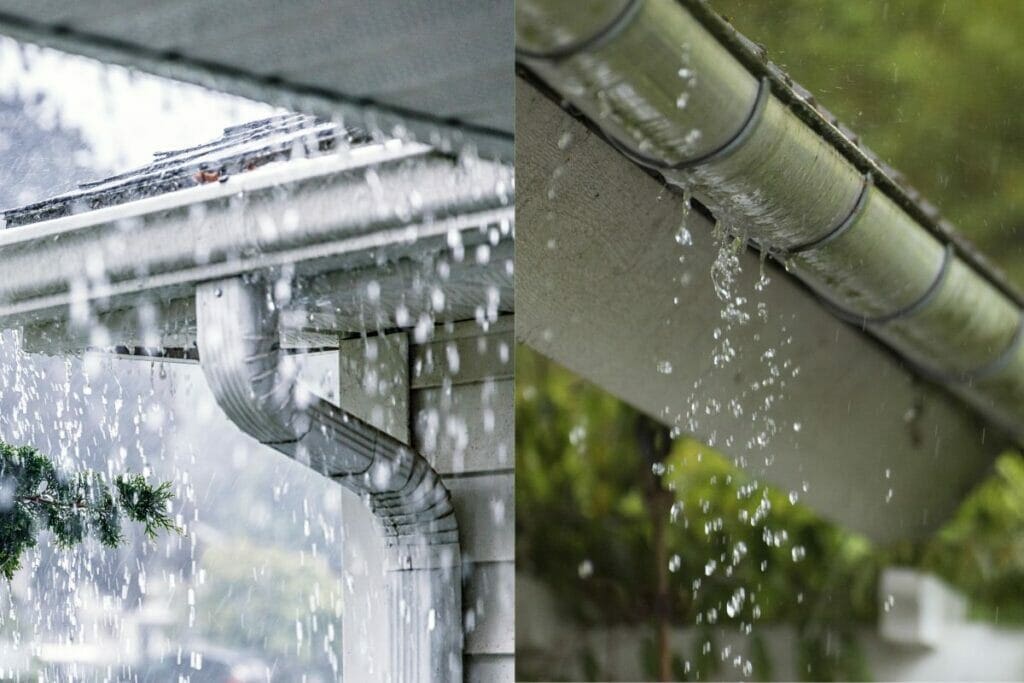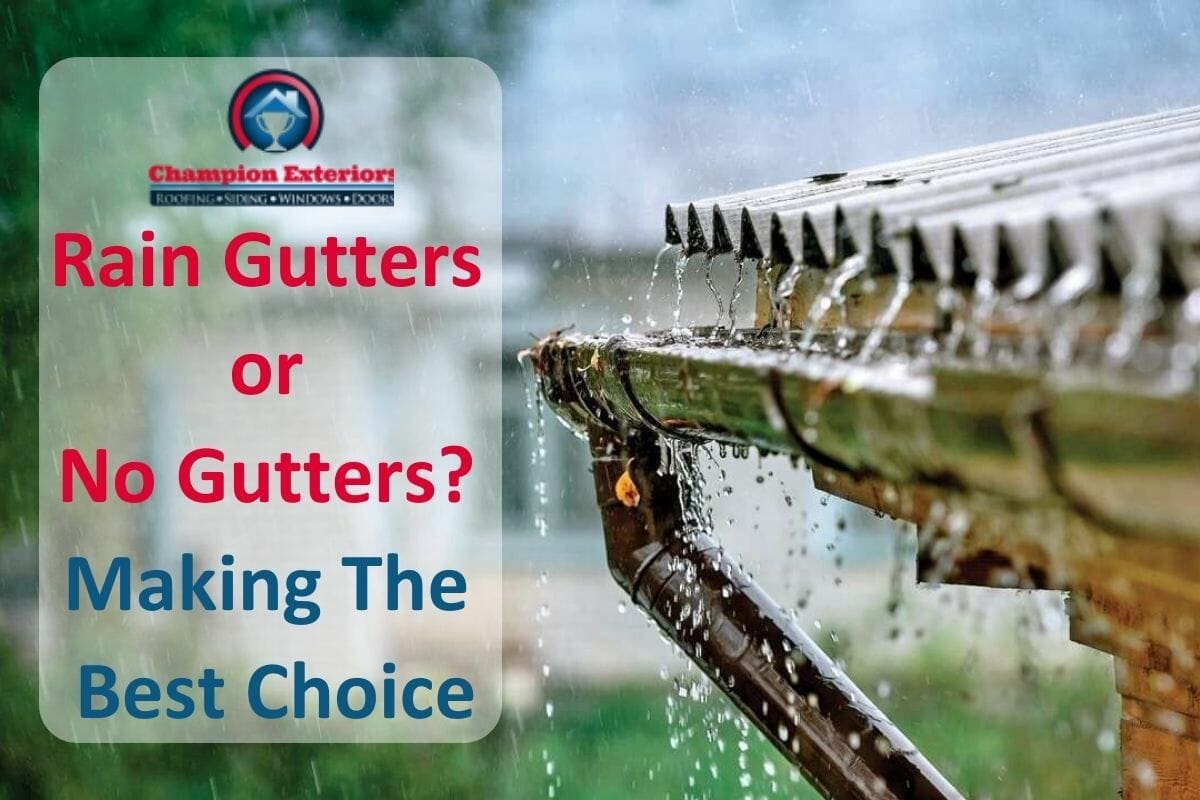Should I install rain gutters? If you are a new home or business owner who is concerned about protecting your property, this question may be on your mind. Many people have questions like this one before and during their home construction and roof installation. While you can always ask your roofing contractor for advice, we’ve put together this guide to help you decide which is best for your commercial or residential property.
As experienced and responsible roofers at Champion Exteriors in New Jersey, we are prepared to answer the question of whether or not you need rain gutters. Depending on the climate conditions in your area, your budget, and your roof type, we will take you through the pros and cons of installing, or not installing, gutters to help you make the right decision for your home.
The Basics of Rain Gutters
Before jumping into the details, let’s start by going over the basics.
Rain gutters are installed along the roof line and over the fascia to collect the water streaming off your roof and direct it into the drainage system. Though the purpose of installing gutters is to keep your home and foundation safe and dry, they may not be necessary for all buildings.
Rain gutters come in various shapes and profiles, including K-style gutters, half-round gutters, seamless gutters, and box gutters. Depending on your home’s needs and the size of your roof, a roofing contractor can help you choose gutters that best fit your style and drainage requirements. There are two main types of gutter systems: seamless gutters and sectional gutters. Seamless rain gutters are built and fitted on-site, while traditional sectional gutters are precut during the manufacturing process and are put together during installation.
The Pros of Installing Rain Gutters
1. Protects Your Home’s Foundation
Rain gutters are crucial for proper drainage, silently diverting water away from your foundation and preventing costly damage. Without gutters, rainwater can splash onto the ground near your foundation, eroding the soil. Over time, this can lead to cracks in the foundation and other structural issues.
Also Read: Tips To Help You Deal With Roof Leaks In Heavy Rain
2. Preserve Your Siding and Paint
Without rain gutters, storms would cause water to flow down the side of your home. This makes your siding vulnerable to moisture and related damage. Plus, the water can leave streaks and stains, reducing the curb appeal of your home and potentially leading to premature siding replacement.
3. Stops Basement Flooding
A flooded basement can be a homeowner’s worst nightmare. Fortunately, rain gutters can help prevent this by ensuring rainwater doesn’t pool around your home’s foundation. Instead, it’s directed away from your house, reducing the risk of basement flooding.
4. Prevents Mold and Mildew Growth
Mold and mildew not only cause unsightly stains but are also harmful to your health. By diverting rainwater away from your walls, gutters prevent excess moisture from seeping into your home. This makes it harder for mold and mildew to grow.
The Cons of Installing Rain Gutters
1. Maintenance Required
One of the most significant downsides of installing gutters is the maintenance they demand over their lifespan. Gutters are prone to collecting leaves, twigs, dirt, and other debris, especially during the fall. If you neglect to clean and maintain gutters, they can become clogged, leading to water overflow and potential damage to your home. This gutter cleaning process sometimes becomes a burden for homeowners, but luckily, some roofing companies offer gutter cleaning services.
2. Cost of Installation
While rain gutters provide long-term benefits, their initial installation cost can be relatively high. The cost of gutters depends on the materials you choose and the complexity of the installation. If you choose high-quality materials like copper to increase your home’s curb appeal, it can be quite expensive, and labor costs can add up if you choose a professional installation.
Other than the main set of gutters, you may need to install gutter guards and downspout extensions to complete the drainage system, which will increase the total installation cost.
3. Potential for Clogs
Despite their best efforts, gutters can still become clogged, especially if your home or office is surrounded by trees. When gutters are clogged, rainwater can overflow them, causing damage to your home’s siding, foundation, and landscaping. In addition, the clogged gutters create a welcoming environment for mosquitos and other pests.
4. Ice Dams in Cold Climates
In regions with cold winters and heavy snowfall, gutters can contribute to the formation of ice dams. Ice dams occur when snow on your roof melts, runs down to the eaves, and refreezes along the gutters. The weight of the ice can also damage the gutters themselves, requiring major repairs or a complete replacement.

Should You Install Rain Gutters In New Jersey?
Now, let’s decide whether or not you should install rain gutters on your home or office in New Jersey.
1. Climate and Precipitation Patterns
As a New Jersey resident, we don’t need to tell you about the weather and climate patterns here. The climate in your area is a critical factor to consider before starting a gutter installation or replacement. Here are some questions to consider:
Rainfall Frequency: Throughout the state, the frequency of rain and snow depends on local climates. Does your region experience frequent rainfall or occasional heavy downpours?
Snowfall: Do you live in an area with heavy snowfall in the winter months?
Climate Extremes: Is your climate characterized by extreme weather conditions such as hurricanes or heavy snow storms?
Understanding your local climate can help determine how much rainwater your home is exposed to and the potential risks of not having gutters.
2. Home Design and Roof Configuration
Your home’s architectural design and roof configuration also play a role in the decision.
Roof Pitch: Steep roofs tend to shed water more efficiently, reducing the need for gutters.
Roof Size: Larger roofs collect more rainwater, increasing the potential for water damage if not properly managed.
Roof Overhang: Homes with minimal roof overhangs are more vulnerable to rainwater splashing against the walls.
Assess how your home’s design interacts with water runoff to determine whether gutters are necessary.
3. Potential for Water Damage
If you are thinking of installing gutters, evaluate the risks of water damage to your home. Think about the following:
Siding and Exterior Materials: Consider the material used for your home’s exterior. Some siding materials, such as vinyl and wood, are more resistant to water damage than others.
Basement and Crawl Space: If you have a basement or crawl space, water pooling around your foundation can easily seep into these areas, increasing the risk of flooding or moisture infiltration.
Consider the potential costs of water damage repairs and weigh them against the cost of installing gutters.
4. Budget and Installation Costs:
Installing gutters comes with an upfront cost. If you decide to install rain gutters, think about these factors:
Material Choices: Some gutter materials, such as copper and steel, are more costly than others. The type of material you choose highly impacts the cost of gutter installation.
Labor Costs: For proper gutter installation, you are recommended to hand over the project to skilled professionals. Get quotes from reputable contractors to estimate labor expenses.
Additional Components: Depending on your needs, you may require gutter guards, downspout extensions, or rain barrels, which can add to the overall cost.
5. Maintenance Commitment
As we discussed earlier, installing rain gutters means dealing with their regular maintenance requirements, which can be expensive and time-consuming if left unchecked.
Cleaning Frequency: Gutters need periodic cleaning to prevent clogs and ensure water flows smoothly. If you are unwilling to do this, you can hire a professional service but keep in mind it will cost you.
Winter Maintenance: In colder climates, gutters can fill with ice and snow, necessitating additional maintenance.
Do You Want To Install Rain Gutters On Your Home In New Jersey?
If you’re still unsure whether you should install rain gutters, don’t hesitate to contact a local contractor for guidance. Roofers in the area will understand the impacts of the weather on your community and can provide you with personalized recommendations.
At Champion Exteriors in New Jersey, we have always helped homeowners make the right decision according to their priorities and preferences. We have years of experience installing and maintaining drainage systems, and we would love to help you find the best gutters for your home. Call us today at (609) 845-3576 for a consultation about your gutter installation.


